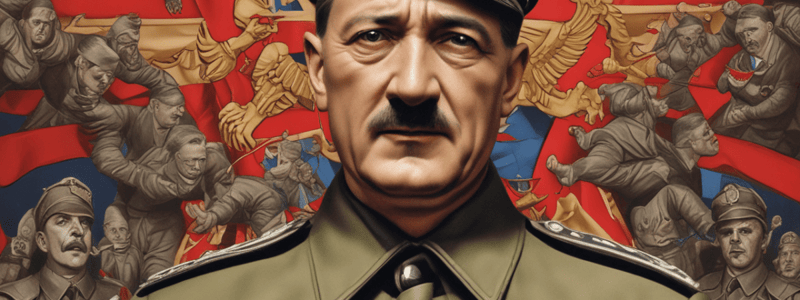Podcast
Questions and Answers
What was Adolf Hitler's background before joining the German Workers Party?
What was Adolf Hitler's background before joining the German Workers Party?
- He was a prominent politician
- He was a former amateur artist and army veteran (correct)
- He was a successful businessman
- He was a renowned philosopher
What led to the rise of Hitler and the Nazis in Germany?
What led to the rise of Hitler and the Nazis in Germany?
- Germany's economic prosperity after World War I
- The stability of the Weimar Republic
- Germany's loss in World War I and the harsh Treaty of Versailles (correct)
- The popularity of the ruling government
How did Hitler initially rise to prominence?
How did Hitler initially rise to prominence?
- Through his economic policies
- Through his powerful speeches blaming the Jews (correct)
- Through his military leadership
- Through his diplomatic skills
What event provided Hitler with the opportunity to seize power in Germany?
What event provided Hitler with the opportunity to seize power in Germany?
How did Hitler consolidate his power after becoming Chancellor?
How did Hitler consolidate his power after becoming Chancellor?
Flashcards are hidden until you start studying
Study Notes
- In September 1919, Adolf Hitler, a former amateur artist and army veteran, joined the German Workers Party, later known as the Nazis.
- Germany's fall under Hitler's sway can be traced back to the country's loss in World War I and the harsh conditions imposed by the Treaty of Versailles, leading to widespread disillusionment and a desire for a stronger, unified Germany.
- Hitler rose to prominence through his powerful speeches blaming the Jews for Germany's post-war struggles, gaining popularity despite a failed coup attempt in 1923 which resulted in his imprisonment.
- The Great Depression in 1929 further destabilized Germany, providing Hitler with the opportunity to seize power through promising a return to greatness and criticizing the ruling government.
- After winning a majority in the 1932 elections, Hitler became Chancellor and quickly consolidated his power by tripling the military's size, banning rival parties, implementing anti-Semitic laws, and becoming an absolute dictator as Fuhrer in 1934.
Studying That Suits You
Use AI to generate personalized quizzes and flashcards to suit your learning preferences.




